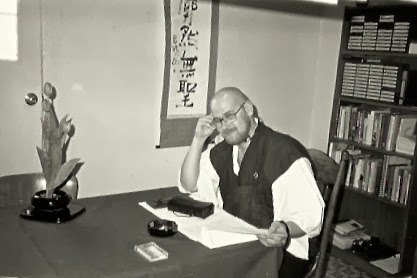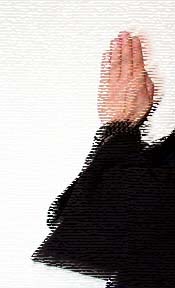
Enso by Ven. Anzan Hoshin roshi, circa 1994
eMirror Vol 26, No. 3

Enso by Ven. Anzan Hoshin roshi, circa 1994
eMirror Vol 26, No. 3
Friday, January 14th
Edited by the Practice Council
The White Wind Zen Community:
An international community practising and teaching Dogen’s Zen since 1985.
Zen calligraphy or Zen sho, Zen brush work, when it is done by someone who is either exploring or showing what Zen is, works with the space of the paper, the depth of darkness of the ink, the proportions of each stroke and their relationships with each other and the space in just this way. Of course, there is never enough time to think about any of this when doing a sho. The ink is soaking into the paper and beginning to spread as soon as the stroke emerges from the intimate contact between brush and paper. You cannot think about it before hand. There can be a sense of what the direction or presentation of the work could be before you touch the brush. But you must release this so that the weight of the brush can tell you how much ink is held by the bristles and, as you lift it, where, whether more to the right or left. Rolling the brush slightly with the fingers to bring the weighted area to where it should be, the bristles touch the paper and the ink seeps and spreads. As the breath, the posture, the shoulder, the arm, the wrist, the hand move with the friction of brush and paper, the other hand upon which the weight rests must also be felt fully otherwise the next turn of the brush will be skewed. As those students who study Zen sho with me privately know, you must practice brushing thousands of circular strokes to know what a circle can be, thousands of ichi or the horizontal character for one, before you are ready to learn what the brush, ink, paper, and the body have to show. There is a deep intelligence of the dynamics of space and form that emerge from this kind of training.
The kind of art that I am most interested in is art that directly demonstrates Sky, Ground, and Being. The open Sky of the possibilities of the medium before it has been used and the Sky of the space of doing the work. The Ground of how the work was done and of how it is present in the work. The Being of actualizing the possibilities of the medium and the actual presence of the work.
-Ven Anzan Hoshin roshi, continuing Class Two: "Both Eyes Open" in the series "Zen Arts: The Flowering of the Senses", October 1999 Daruma-ki O-sesshin, Dainen-ji.
Fusatsu: January 19th, February 2nd and February 16th.
Daiji-ki
January 22nd is the memorial of the date of death of Daiji Tenku daiosho, who was the Teacher of Joshu Dainen daiosho, both of whom Anzan Hoshin roshi studied with.
Nehan Seven-day O-sesshin:
The Nehan O-sesshin begins on Friday, February 11th, at 8:00 p.m. and will end on Friday, February 18th at noon. Students attending (or sitting at home in alignment with the O-sesshin) are reminded to send their schedules to schedule@wwzc.org.
Hermitage:
The Roshi is currently in an extended period of "self-isolation" due to underlying health issues until the COVID-19 situation clarifies.
Beginning Instruction in Zen Practice:
For information concerning our Long-distance Training Program, please visit this Web Page: https://wwzc.org/long-distance-training-program
Ven. Chunen Rampal angya sat a two-day retreat on Sunday and Monday, January 9th and 10th, at Guelph Zazenkai. Rev. Chiso anagarika sat her weekly semi-retreat on Tuesday, January 11th at her home in the Berkshires. Chunen angya sat a two-day retreat on Sunday, January 9th and Monday, January 10th at his home in Guelph, Ontario. Deshi Ryoshin sat part of the retreat schedule in alignment with the January sesshin in her home in Ottawa. Deshi Senbo and Isshin sat full two-day retreats in alignment with the January Sesshin. Probationary deshi Chantal Maheu sat a two-day retreat in alignment with the January Sesshin. Beth Buerkle sat a one-day retreat on Wednesday, January 5th at her home Chamcook, New Brunswick. Tarik Kaya sat a half-day retreat on Saturday, January 8th at his home in Ottawa, Ontario.
If you would like to sit a retreat at home please follow the schedule outlined in this page: https://wwzc.org/retreat-schedule-public-students. After your retreat, please send an email to schedule@wwzc.org to confirm that you sat a retreat and include the duration and location.
Saturday, January 15th to Saturday, January 22nd
Saturday, January 15th: "Drawn In, Moving Forth": Zen Master Anzan Hoshin's Commentaries on Eihei Dogen zenji's “Bendowa: A Talk on Exerting the Way”: "Endless and Beginningless Practice and Realization" (16 of 28)
Sunday, January 16th: SAkN “Root Cycle Three” by Ven. Anzan Hoshin roshi: “Frames of Time and Space” (teisho 2 of 8)
Monday, January 17th: “Every Breath You Take” by Ven. Shikai Zuiko o-sensei: “Seeing Flowing Water" (Dharma Talk 71)
Thursday, January 20th: "The Forms of Attention" by Ven. Jinmyo Renge sensei
Saturday, January 22nd: "Drawn In, Moving Forth": Zen Master Anzan Hoshin's Commentaries on Eihei Dogen zenji's “Bendowa: A Talk on Exerting the Way”: "Traces of the Transmission" (17 of 28)
Associate and general students should continue to follow the recorded Teachings schedule for the sitting you were attending at the monastery, and listen to that during your home practice.
You can access the online Recorded Teachings Library at wwzc.org/recorded-teachings-schedule.
You can also use the streaming site at app.wwzc.org to live stream recordings from the online Library. If you have forgotten your password or need assistance with accessing the recorded Teachings, please email schedule@wwzc.org.
Please note that teisho should be listened to in the correct order and with none missed out as themes, metaphors, questions raised and answered evolve in spirals throughout the series.
While most of the online Recorded Teachings library is password-protected and only accessible to students of the Lineage of Zen Master Anzan Hoshin, a small selection of MP3 recordings of teisho are accessible to the public at wwzc.org/recorded-teachings Additional recordings will be uploaded periodically. MP3 recordings of four recorded teisho by Ven. Anzan Hoshin roshi are currently available:
Dharma Position https://wwzc.org/dharma-position
Eyes See, Ears Hear https://wwzc.org/eyes-see-ears-hear
Embarrassment https://wwzc.org/embarrassment
Ven. Anzan Hoshin roshi's reading of his translation of Eihei Dogen zenji's “Bendowa: A Talk on Exerting the Way”: https://wwzc.org/bendowa-talk-exerting-way

Photograph of Ven. Anzan Hoshin roshi at Daijozan, mid-1980s,
by Ven. Shikai Zuiko sensei
Ven. Anzan Hoshin roshi has recently completed translation work on some shorter texts by Eihei Dogen zenji from the Shobogenzo. The work on these particular texts is based upon the literal translations that he worked on with Joshu Dainen roshi at Hakukaze-ji around 1977-78 followed by many years of putting them down, picking them up, and polishing. Naturally, more essential texts such as Uji, Genjokoan, Shinjin Gakudo and some 40 others were completed first and have been given extensive commentaries by the Roshi. This batch of texts includes Baike: Plum Blossoms, Ryugin: Howling Dragon, and Udonge: The Udumbara Blossoming and many others are nearing completion. Annotation details and successfully conveying them across various document formats are the issue at this point.
Work on Bussho: Buddha Nature, a very long and nuanced text by Dogen zenji, is ongoing.
Roshi is also finishing an update to the Saijo Shingi: The Deportment of Radiance, our manual of monastic training standards which is a supplement to the ancient Eihei Shingi and Keizan Shingi.
Begun by Ven. Shikai Zuiko o-sensei
Finished by Rev. Fushin Comeau shramon following her death

Continuing on with “Painted Cakes: A Zen Dictionary,” a limited edition text written by Anzan Hoshin roshi in the 1980s and last revised in 1994.
Sogo (J) Words which move backwards and forwards. See also omote no go and ura no go.
Posted January 7th, 2021. New entries are posted every two weeks.

Dogen zenji taught in the Tenzo kyokun: Instructions for the Tenzo (https://wwzc.org/dharma-text/tenzo-kyokun-instructions-tenzo) that the work of preparing and serving meals is "a matter for realized monks who have the mind of the Way or by senior disciples who have roused the Way-seeking mind." In alignment with this, part of Zen Master Anzan Hoshin's samu for the Community involves personally overseeing the activities of the ancient office of tenzo. Ven. Jinmyo Renge sensei serves as tenzo and Mishin godo and Saigyo ino offer assistance as tenzo-anja.
The following meals were prepared for meals during the January two-day sesshin:
Saturday:
Breakfast: Spaghettini with sauteed strips of Spanish onion, poblano and red bell peppers, minced ginger, bulgogi sauce, monastery-made Chinese chile oil, shoyu, sesame oil; scrambled eggs.
Lunch: Calrose rice garnished with gomashio (toasted sesame seeds and salt); miso shiru (broth made from kombu, shiro miso, slivered ginger, shoyu, mirin and rice vinegar) with reconstituted shiitake mushrooms, baby bok choy and silken tofu; takuan and ginger.
Supper: Farfalle pasta in garlic butter sauce (chopped Spanish onion caramelized with lots of minced garlic in butter, chile flakes, white wine, grated parmesan, salt, cream); "beans and greens" (gailan, Shanghai bok choy and Napa cabbage seared on the griddle with red kidney beans, red balsamic vinegar, black pepper and salt); cubed fruilano cheese and gherkins with lemon zest.
Sunday:
Breakfast: Fried pasta (leftover farfalle pasta, chopped onion); scrambled eggs.
Lunch: Thai white and brown long-grain rice mixed with diced daikon sauteed in chile sauce; spicy wakame seaweed soup (leftover strained miso shiru broth and shiitake mushrooms, wakame, ginger, shoyu, roasted chile oil), with silken tofu; pickled daikon (cubes of daikon quick-pickled in apple cider and white vinegar, water, sugar, salt).
The following meals were prepared on Monday, Tuesday and Thursday evening for residents this week:
Monday Yakuseki:
Blended cream of butternut squash soup (butternut squash, white onion, thyme, cayenne, lots of black pepper, salt, and a little cream); Lundberg Farms short-grain brown rice with butter and baby peas; friulano cheese with gherkins.
Tuesday Yakuseki:
Thai curry with tofu (vegetarian) or with basa fillets: For the Thai curry, Aroy-D coconut milk reduced, sauteed onion, celery, bok choy, red curry paste, lime juice, chopped coriander stems, sliced medium-firm tofu or baked basa fillets, lots of fresh coriander; salad of Romaine lettuce, leaf lettuce, chicory, radicchio, radishes, celery, thinly sliced red onion, dressed with white balsamic vinegar.
Thursday Yakuseki:
Warm crusty rolls; minestrone soup (chopped onion, celery, carrots, minced garlic, chopped poblano and red bell peppers, diced jalapenos, chopped green cabbage and cremini mushrooms, red and white kidney beans, tomato juice, oregano, basil, thyme, cayenne pepper, pasta shells, served with grated extra-old cheddar cheese); artichoke hearts and black olives with finely sliced red onion.

If you would like to thank someone for a contribution they have made, please feel free to send an email to Jinmyo osho at rengezo at Gmail dot com, but be sure to type "eMirror" in the subject line.
From Mishin godo:
Thank you to the Roshi for the "Round and Bright" series of teisho recorded in 1997 that we are listening to during recent Sesshin and O-sesshin. Thank you to Jinmyo sensei for leading the January sesshin and the evening chanting of the Vow of Samantabhadra.
From Claude Schryer:
Thank you to the Ino for our practice interview last week where he provided clear guidance and instructions on my practice that I really needed to hear. Thank you to Ven. Jinmyo Renge sensei for the "Transparent” Dharma talk, which I found insightful and uplifting. Thanks also to Ven. Anzan Hoshin roshi for the "Zen Arts: The Flowering of the Senses'' series, which continues to help me open my senses.
From the Office of the Treasurer:
Thank you to Rob Parisien and Runfang Zhang for donations.
|